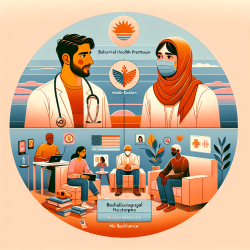In the realm of pediatric oncology, ensuring the continuation of treatment for children with cancer is a multifaceted challenge, especially during times of social unrest and pandemics. The recent study by Zuleta et al. (2022) titled "Securing continuation of treatment for children with cancer in times of social unrest and pandemic" offers critical insights that can be leveraged to enhance the efficacy of treatment continuity. This blog aims to distill the findings of this research and provide actionable strategies for practitioners in the field.
Key Findings from the Research
The study, conducted in Chile, focused on the impact of social unrest and the COVID-19 pandemic on families of children with cancer. A socioeconomic survey of 525 families revealed significant challenges:
- 75% of families had only one breadwinner.
- 52% had an unemployed family member.
- 90% of job losses occurred during the social unrest and pandemic.
In response, four primary interventions were implemented:
- Safe transportation to treatment centers.
- Provision of food and heating resources.
- Improved internet connectivity for telehealth services.
- Guidance in accessing governmental emergency aid.
Implementing the Research Outcomes
For practitioners, the study's outcomes underscore the importance of a holistic approach to treatment. Here are some strategies to consider:
1. Safe Transportation
Ensuring safe and reliable transportation to treatment centers is crucial. Collaborate with local organizations or transport services to provide secure travel options for families. This can help mitigate the risk of missed appointments.
2. Food and Heating Support
Addressing basic needs such as food and heating can alleviate additional stress on families. Partner with community resources or non-profits to provide essential supplies. This support can significantly improve the family's ability to focus on the child's treatment.
3. Enhancing Telehealth Services
The pandemic has highlighted the importance of telehealth. Ensure that families have access to reliable internet connectivity and necessary devices. Training sessions on using telehealth platforms can also be beneficial.
4. Navigating Governmental Aid
Many families may be unaware of or unable to navigate governmental aid programs. Providing guidance and assistance in accessing these resources can offer substantial relief. Consider having a dedicated staff member or social worker to assist families in this process.
Encouraging Further Research
While the study by Zuleta et al. provides valuable insights, further research is essential to continually improve treatment continuity. Areas for future investigation could include:
- Long-term outcomes of the implemented interventions.
- The psychological impact of social unrest and pandemics on families and children.
- Effective strategies for remote therapy and telehealth in pediatric oncology.
Engaging in or supporting ongoing research can contribute to a more robust understanding and better outcomes for children with cancer.
Conclusion
The findings from the study "Securing continuation of treatment for children with cancer in times of social unrest and pandemic" highlight the critical need for comprehensive support systems. By implementing the outlined strategies and encouraging further research, practitioners can significantly improve the treatment continuity and overall well-being of children with cancer and their families.
To read the original research paper, please follow this link: Securing continuation of treatment for children with cancer in times of social unrest and pandemic.










